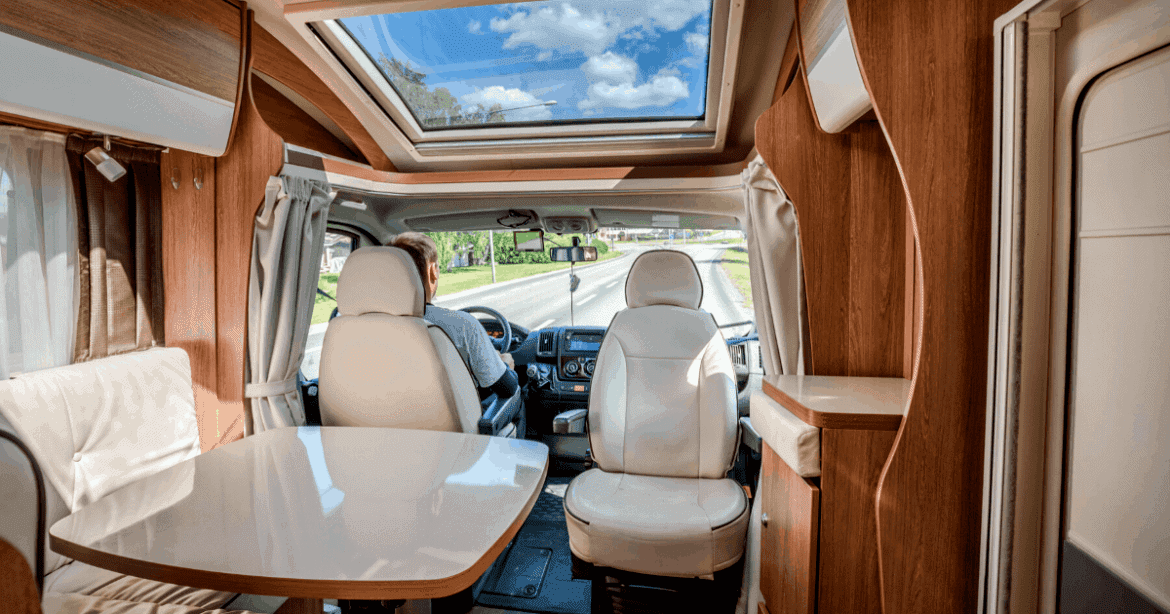Tips for buying and financing RVs and boats
Going out for a recreational weekend in a boat or road tripping in an RV is one of the most enjoyable ways to spend time—it’s the perfect balance of connecting with others and with nature. In fact, more than 11% of U.S. households owns an RV and there were around 12 million boats registered and documented last year. If you’d like to join in the fun by purchasing a boat or RV, we’ve got tips to help make your purchase go smoothly. And, of course, if you need an RV or boat loan, we can help with that, too.
Tips for buying an RV
Choose an RV based on lifestyle

If you want to camp almost every weekend with kids or pets, a more spacious floorplan could make RVing more comfortable. If you love the idea of camping in a place without water, sewer and electric hookup, you’ll want to make sure your RV is easy to maneuver and has large holding tanks. If you plan on living in your RV, choosing one with lots of home amenities can make the transition from house to RV easier.
Campers vs. RVs
Technically, campers fall under the RV umbrella—but the difference is that campers can only be towed, not driven. If you’re thinking a tow-along would be a more cost-effective option, keep in mind that affordable choices are more likely to be small, such as a pop-up camper. Otherwise, campers can be just as expensive as RVs.
Pros and cons of buying new vs. used
If you’re deciding between new or used, check out these pros and cons to help make the best decision for you.
Pros of buying new:
- You’re the first to use it.
- It comes with a manufacturer’s warranty.
- You won’t have to fix, repair or live with previous wear and tear.
- It’s likely you’ll find exactly what you want in an RV.
Cons of buying new:
- You’ll pay more.
- The RV will depreciate quickly. Like any other new vehicle, the minute you drive a new one off the lot, it loses 21% of its value.
Pros of buying used:
- Any bugs may be already be worked out by the previous owner.
- It’s much more cost-effective.
- There is less depreciation.
- Insurance policies will cost less.
Cons of buying used:
- You may experience unexpected repair expenses that are not covered by warranty.
- It may take longer to find exactly what you want in an RV.
If you’re deciding whether to buy from a dealer or private seller, there are pros and cons to both. On one hand, a dealer is incentivized to keep a happy customer and may go further in fixing any issues. On the other hand, a private seller isn’t always as concerned as a dealer in making a large profit. They may sell lower just to get the RV off their hands.
Regardless of whether you plan to buy a new or used RV, be sure to check sites like RV Trader® to determine market value of similar models or think about attending an RV show.
Inspecting the RV
Especially when buying a used RV, inspect it closely for issues or damage. Obvious signs that you may want to walk away from include mold, corrosion, rust and leaks. Be sure to check underneath the camper and in places that are hidden from the eye. And don’t forget to check the VIN number to review its history. Finally, check the age of the tires. You may want your mechanic to estimate their remaining life. You don’t want to be left with an unexpected flat tire far from home (not to mention incurring unexpected costs).
Additional RV costs
Speaking of unexpected costs, make sure you know what you’re getting into with additional costs. Are you going to be buying paint or extra furnishings to remodel the interior? When budgeting for your RV, remember to factor in gas, insurance, campground fees and, if needed, storage costs during the off season.
RV financing
It can be easy to get caught up in road tripping excitement when you’re looking at RVs but remember to not overextend yourself. It’s important to set a budget and stick to it. Nothing can spoil RV fun like financially regretting your purchase.
If you’re looking for an RV loan, you’ll have two choices: secured or unsecured. They’re usually paid off in fixed monthly payments that can last from two to 20 years.
A secured loan means you use your RV as collateral—if you fail to make your payments, you lose your RV. If you have bad credit, securing your loan may help you get the RV you want. But if you go this route, be careful to make sure you can easily afford the payments. An unsecured loan is sometimes faster to get, although it may come with higher interest rates.
Tips for buying a boat

How do you plan to use your boat?
When considering what kind of boat to buy, think about your lifestyle. Is fishing by yourself your favorite way to spend a weekend? Do you live near the ocean and could spend all day in a sailboat? Is water skiing on a river with a group of people your idea of the perfect getaway?
Think about the features your boat will need to suit your lifestyle.
Buying new or used
Once you’ve narrowed down your needs and wants, consider whether you’ll buy new or used. Used boats are less expensive because their value has already depreciated while new boats may last longer and have better features.
When considering a used boat, check to make sure the oil isn’t gritty (this means the engine could be seriously degrading) and take it for a test run. You can also find a marine expert with Namsglobal to inspect your boat to make sure you don’t miss anything that will make you regret your purchase.
Think about realistic features
Sometimes a boat can seem appealing because it has numerous features, like sleeping several people or moving at high speeds. But before you put money down for a decked-out boat, consider how many of those features you’ll actually use. You don’t want to pay for them for no reason.
Look for NMMA certified boats
A National Marine Manufacturers Association-certified boat has been inspected to ensure it adheres to both the U.S. Coast Guard minimum regulations as well as the higher standards set by the American Boat & Yacht Council (ABYC). Purchasing an NMMA-certified boat means you’re buying a boat that’s going above and beyond the bare minimum when it comes to quality and safety.
If you’re buying a used boat that was NMMA certified when it was new, keep in mind that regulations may have changed since then, and it may not pass current NMMA standards.
Additional costs
Once you buy a boat, the cost to own and use it can add dollars you may not have considered. Boats tend to take more gas than you may expect, and then you’ll need life jackets for every passenger, engine maintenance, registration and insurance fees, and storage. While all of that can be well-worth it, make sure you estimate the total cost of your boat beyond its initial price.
 Boat financing
Boat financing
The first thing to do when deciding how to finance your boat is to set a budget so you don’t overextend yourself. Use this boat loan calculator to help you determine the loan you can afford.
You can get a boat loan from a financial institution or if you are buying new, a boat dealer will likely have financing. Like with anything, the higher a down payment you can afford, the lower your rates will be. A boat loan works in fixed monthly payments, usually over a duration of two to 15 years. Down payments can be as low as 0% or as high as 20%. Good credit makes it easier to get the boat loan you want, but it’s also helpful for a lender to see you have liquid assets covering 12 to 16 months of payments.
Hit the road or the water (or both)
If you’re itching to make the most of summer by buying an RV, boat or both, we can help. Ask about an RV or boat loan and see our rates. Greater Alliance can help you get an affordable personal loan as well as talk you through your options. Contact us today to learn more.
In addition, credit union members have access to even more discounts on RVs, boats and other recreational vehicles through Love My Credit Union® rewards.


 Boat financing
Boat financing